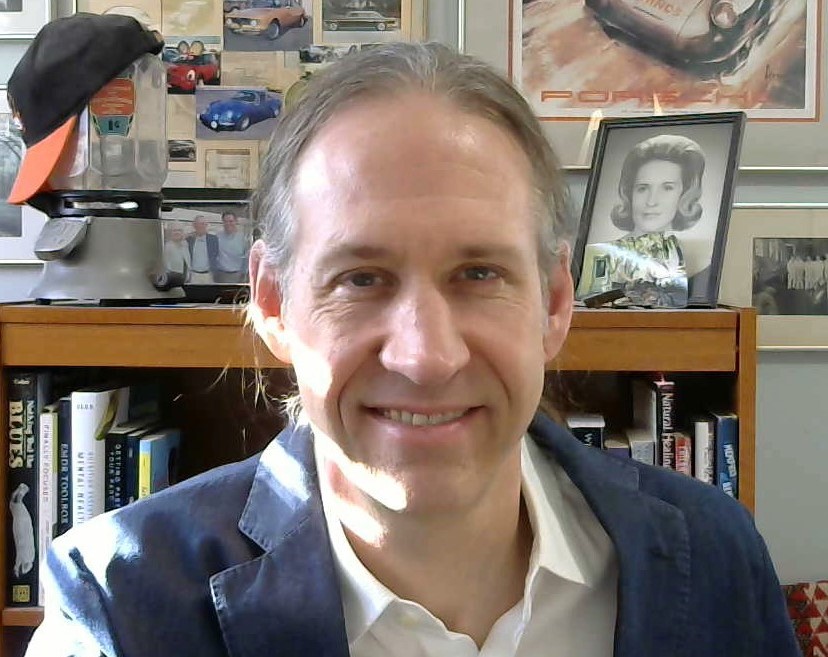Chris Robinson
The Many Voices of Peace Studies: Celebrating 50 Years
Chris Robinson
Chris Robinson, a clinical social worker/psychotherapist/health coach, began his involvement with Friends of Peace Studies around 2007. He first learned of the organization and the Peace Studies program while in school at MU working on his master’s degree through the School of Social Work.
“A lot of people don’t know that within the profession of social work, we are mandated to address issues of social injustice,” Robinson says. “And also, to challenge them directly. So, I started hearing about Friends of Peace Studies and looked into some of the names of individuals involved, and I was like, ‘These are really interesting, passionate, committed, smart individuals, and I’d like to get to know them better.’”
Some involved were retired professors, some active, some members of the community ….
Searching for Mentorship
“I just started looking into the histories of these individuals and the things they accomplished and the books they wrote, and was like ‘this is really what I wanted.’ In a nutshell, I wanted mentors in peace and justice – that was my incentive and motivation to connect with this group.”
Not only was he involved in Friends of Peace Studies, but he also served on the board: vice president, in charge of membership, and president (part of that co-chaired with Jack Kultgen). He is still president today, about a decade since he took the oath to lead the organization.
He says Friends of Peace Studies’ mission today is two-fold: support the Peace Studies academic program – some of that through helping promote events and speakers. And two, to be the activist arm of the Peace Studies program.
“We apply the resources of the Peace Studies program and then translate that into some sort of community action, which has included a number of different initiatives and different public forums, panel discussions and such, oftentimes focusing on various social actions on campus and on the campus historically.”
These include protests such as Shantytown on campus in 1986 opposing the apartheid in South Africa. And in the early years, Vietnam War protests, also on campus, organized by Professor Bill Wickersham who faced jail and job loss for his actions.
Out of those protests, however, came the first Peace Studies class in 1971, with the first Peace Studies graduate, Jerry Smith, in 1975.
Independent, Yet Joined
According to Robinson, “The Peace Studies academic program was created to be largely independent from university oversight. And as a result, Friends of Peace Studies developed to raise money to organize and oversee the Peace Studies Program. So, they kind of co-joined at first.”
The first class, Peace and World Order, was taught by Wickersham and was the “seed for peaceful resistance,” eventually developing into a full-blown academic program, says Robinson.
He says while Friends of Peace Studies used to be more involved with the daily operations of Peace Studies Program, now has a more behind-the-scenes role: funding, support, activism.
“Always, one of the goals was to be able to have academic freedom to focus on the subjects that we want to focus on, regardless of how controversial. While Peace Studies is semi-independent from the University, Friends of Peace Studies is completely autonomous though we enjoy the credibility of being associated with the university. Our goal is really to move the needle on peace and justice issues, in the world and in the community.”
Living the Experience
Robinson, like so many others, cites bringing prominent speakers to campus as being a highlight of the organization and Peace Studies program efforts.
“We almost always had dinner beforehand. And so that’s given me an opportunity to have great conversations with all of the members. Those are perhaps my fondest memories with two or three really interesting conversations going on simultaneously and I am like, ‘Oh I want to listen to this and then I will listen to that.’”
He says today’s Peace Studies program has great potential of even greater success due to the sheer intellectual and academic resources available to them through the university.
“I don’t see a lot of limitations. I just see potential.”
And Friends of Peace Studies is there to assist. A recent project includes launching a think tank called the Institute for Religion, Justice and Politics. The think tank will explore the relationships between these three subjects and spotlight themes of peace and justice present in the world's religions. The goal is to foster peaceful and ethical behavior.
“We have members, and we have goals, and we are striving structurally. This is a new project this semester. We also have a speakers’ series that will begin next semester. This will be a joint effort with the Peace Studies Program.”
Robinson says it has been an honor to be involved with the Peace Studies program.
“It’s something I have really enjoyed,” he says. “Getting to work with great individuals, great minds. Before I moved to Columbia, I was a blues and rock musician. A little rough around the edges. And it was great to be able to connect with and be mentored by these individuals and to be able to learn from them. It’s been a wonderful opportunity for me, and I hope to continue to pass that along – to continue the tradition.”
